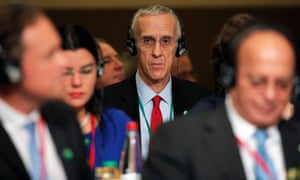Extract from The Guardian
US, China, Canada and EU among big carbon emitters
at UN summit supporting 1.5C target to protect most vulnerable
countries such as small island states
US Special Envoy for Climate Change Todd Stern:
‘We are working with other countries on some formulation that would
include 1.5C’ Photograph: Thibault Camus/AP
Tuesday 8 December 2015 04.42 AEDT
The world’s biggest climate polluters rallied
around a stronger target for limiting warming on Monday, saying they
were open to the 1.5C goal endorsed by the most vulnerable countries.
In the final push to a climate agreement, the US,
Canada, China and the European
Union declared they were now on board with demands from African
countries to adopt an even more ambitious goal to limit warming.
“We can’t go home and say ’we saved the
planet, check.’ This issue will continue to be a top priority for
the president and the White House coming out of Paris heading into
next year and for remaining time that he is in office because there
is more work to do,” a White House official said.
Small island states say the current
temperature goal of 2C would bring doom, drowning low-lying
areas, and forcing mass migration.
They want an agreement from Paris that would seek
to keep warming at around 1C, which
is about the current level of warming above pre-industrial levels.
In the last few days, the 1.5C target has become
short-hand for reaching a more ambitious agreement that would keep
pace with real-time changes already underway on the ground.
“We are working with other countries on some
formulation that would include 1.5C,” Todd Stern, the State
Department envoy, told a press conference.
China said it was supporting a 1.5C target and for
rich countries to accept the principle that they are responsible for
long term and irreversible damage done by climate change.
“There are some things that you cannot adapt to.
We need to see something to address permanent losses,” said a
spokesman for the G77 and China group of 132 countries. A Chinese
spokesman said: “We stand with other developing countries.”
Canada,
regarded as a climate villain for the last decade, also came around
with Catherine McKenna, the new environment and climate change
minister, embracing 1.5C in closed door sessions.
The EU spokeswoman Carole Dieschebourg said
ministers were “open” to a 1.5C target. “The difficult issues
will be finance and differentiation,” she said, referring to the
idea that rich countries should do more than poor countries. “We
have a difficult week ahead. All the major issues are
unresolved.”
But there were some prominent hold-outs. India said the 1.5C target raised immediate issues of fairness because it would put greater limits on capacity of developing countries to grow their economies.
But there were some prominent hold-outs. India said the 1.5C target raised immediate issues of fairness because it would put greater limits on capacity of developing countries to grow their economies.
“Why not 1C, why 1.5C,” Ashok Lavasa, India’s
lead negotiator, said. “The moment we are talking about target we
are also talking about carbon budgets. We need to look at the
development space that is available and therefore those who are eager
to maintain it below 2C should actually be working to maintain that
carbon space so that they don’t compromise the needs of developing
countries.”
Campaign groups meanwhile said the aspiration to
1.5C was far-removed from reality. The current pledges from 185
countries won’t
even restrict warming to 2C.
Erich Pica, the director of Friends of the Earth
US, accused the rich countries of backing vulnerable states on the
1.5C goal to crowd out bigger developing countries.
“There is a dangerous push that developed
countries are using on this push to 1.5C to blur the lines,” he
said. “The US and European countries are adopting the idea of 1.5C
as a mitigation target but they are blurring of the lines on what has
to happen to have a just and fair sharing of the 1.5C equation.”
Ban Ki-Moon, the UN secretary-general, also
sounded an urgent tone, warning “the clock is ticking towards a
climate catastrophe”.

No comments:
Post a Comment